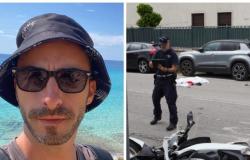Genoa. Between 600 and 800 tons is the quantity of used oils which the citizens of Genoa are estimated to produce every year and which today is only collected in a small part, mostly ending up in the discharges into sewers and aquifers and causing damage to the environment and home exhaust systems.
To encourage its recovery and correct disposal, the municipality of Genoa has decided, in agreement with the Cone – National consortium for the collection and treatment of used vegetable and animal oils and fats – e Amiu – which manages and provides waste collection and disposal services in the city -, to promote an agreement aimed at encouraging the widespread collection of vegetable oils of domestic origin.
And for this reason it leaves today on territory of the city of Genoaafter having already arrived in the province of Genoa, an enhancement of the service and a new information campaign for citizens linked to the separate collection of used vegetable oil and fats with the slogan “Recovered oil saved environment”.
The project was presented today at Palazzo Tursi in the presence of the Councilor for the Environment of the Municipality of Genoa together with Giovanni Battista Raggi president of Amiu Genova, Tommaso Campanile and Francesco Mancini respectively president and general director of Conoe, the Consortium that deals with this recycling chain.
The agreement, lasting three years, provides the progressive extension of the collection with the positioning of the special bins with the characteristic red colour in the various neighborhoods to cover all municipalities in a widespread manner: from public schools to supermarkets to parishes and other meeting places.
An initiative which, thanks to the multiplication of points where citizens can drop off used oil, which went from the current twenty to around a hundred, and to an important awareness campaign through the dissemination of video tutorials, posters, flyers and activities on institutional social channels, it is hoped that it will lead to the collection of all the estimated 600 tons of used oil.
“Among the strategic objectives of this new project – declares the Councilor for the Environment of the Municipality of Genoa – are the increase in the quality of separate waste collection and the promotion of the circular economy. The creation of a virtuous cycle for the collection of exhausted vegetable oils coming from domestic users represents a central element for the prevention of waste production and the defense of ecosystems, as well as a concrete tool for the recovery of raw material from waste which, if badly managed, has a negative impact on the environment. Our objective, with AMIU, is to enrich the circular economy strategy of the city of Genoa and contribute to reducing CO2 emissions, because appropriately treated, this waste can in fact come back to new life in different forms, and make our waste cycle virtuous. waste”.
HOW TO CORRECTLY DIFFERENTIATE USED OIL
Only edible oils should be placed in the appropriate red containers (olive oil, corn, sunflower, etc…) as frying and cooking oil, oil for preserving canned and glass foods (tuna or vegetables) or for seasoning, deteriorated or expired vegetable oils.
The used oil must be filtered from impurities and any food residues to optimize the transformation process from waste to resource, and collected in tightly closed plastic bottles which can be placed directly inside the red containers.
In Genoa in 2023 were collected, mainly in the three ecological islands and through the service Ecovan approximately 47 tons of used oils and fats and around 13 tonnes in the first quarter of this year, but with the new implementation we want to multiply the quantities collected in the area.
The collection of used cooking oil is very important. Throwing oil down the sink, for example, causes serious damage to drain pipes and the functioning of purifiers, increasing management costs. Furthermore, when dispersed in the environment it causes enormous damage by polluting water and land, without considering the costs for the community. It is estimated, in fact, that the purification of water polluted by this waste requires 1.10 euros per kilogram and the consumption of at least 3 kW/h of energy.
“The agreement with the city of Genoa and Amiu is a further step towards a concrete commitment of all the subjects involved in the waste vegetable oil recovery chain, first of all Conoe – declared the president of the Conoe consortium, Tommaso Campanile – which follows numerous specific projects for the systematic recovery of used edible oils in other important Italian cities. Used vegetable oils represent an enormous resource if subjected to correct, conscious and constructive recovery practices. It is a priority duty to proceed to build a collective conscience around this issue based on the principles of environmental protection which begins, in the first instance, with the removal of this waste from dangerous practices of uncontrolled disposal to arrive at a conversion into biodiesel, with positive consequences in terms of greenhouse gas emissions.”
“Careful and correct collection of waste vegetable oils avoids waste of resources and creates new recycling opportunities: an action that enriches the circular economy strategy of cities and contributes to reducing related CO2 emissions – declared the general director of Conoe, Francesco Mancini – Unlike other types of waste, used oils can be completely recycled, giving them a new life in different forms: biodiesel, above all, but also bio-lubricants, soaps, and biodegradable cosmetic products”.
He adds Giovanni Battista Raggi, president of Amiu Genoa: «Strengthening our service and intensifying information to the Genoese on the positive impact that this separate waste collection has on the environment and above all on our sea is one of our objectives. The agreement with CONOE strengthens and confirms our institutional and operational activity with the various consortia of the supply chains that deal with recycling, indispensable relationships in the overall plan that the recovery of resources entails”.
In addition to the ‘red’ oil points, as always, used oil can continue to be delivered to the various collection centers and ecological islands and obviously to the 57 Ecovans. that are stationed in our city on different days and streets. The points where citizens can find the points available to them can be found at this web address.
Tags: Waste bins dedicated recycling oil arrive Genoa







